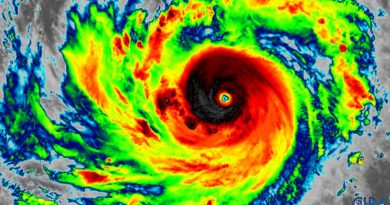Iran launches 22 missiles against U.S. forces in Iraq; Trump says “All is well!”
Washington (Reuters) – Iran launched missiles at U.S.-led forces in Iraq on Wednesday in retaliation for the U.S. drone strike on an Iranian commander whose killing last week stoked fears of a new Middle East war.
Iranian state television said Iran had fired 15 missiles at U.S. targets in Iraq early on Wednesday. The U.S. military said at least two Iraqi facilities hosting U.S.-led coalition personnel were targeted at about 1:30 a.m. Iraq time (2230 GMT on Tuesday). Iraq said 22 missiles were fired.
Iranian officials said Tehran did not want a war and its strikes “concluded” its response to Friday’s killing of Qassem Soleimani, a powerful general whose burial in Iran after days of mourning was completed around the same time as Iran’s missile launches. Iranian state television showed mourners celebrating the attack.
U.S. President Donald Trump said in a tweet that an assessment of casualties and damage from the strikes was under way and that he would make a statement on Wednesday morning.
“All is well!” Trump, who visited one of the targeted sites in Iraq, Ain al-Asad air base, in December 2018, said on Twitter.
One source said early indications were of no U.S. casualties, while other U.S. officials declined to comment.
Iranian state television said 80 “American terrorists” had been killed and U.S. helicopters and military equipment damaged. It did not provide evidence of how it obtained that information.
Germany, Denmark and Norway said none of their troops in Iraq were killed or injured. Iraq also said there were no casualties in its forces.
The force advised the United States to withdraw its troops from the region to prevent more deaths and warned U.S. allies including Israel not to allow attacks from their territories.
Iranian television reported an official in Supreme Leader Ali Khameni’s office as saying the missile attacks were the “weakest” of several retaliation scenarios. It quoted another source saying Iran had 100 other potential targets in its sights.
Pentagon spokesman Jonathan Hoffman said the bases targeted were al-Asad air base and another facility in Erbil, Iraq.
“As we evaluate the situation and our response, we will take all necessary measures to protect and defend U.S. personnel, partners, and allies in the region,” Hoffman said.
Hours earlier on Tuesday, U.S. Defense Secretary Mark Esper said the United States should anticipate a response from Iran for the killing of Soleimani, commander of Iran’s elite Quds Force, a unit of the Revolutionary Guards.
“I think we should expect that they will retaliate in some way, shape or form,” he told a news briefing at the Pentagon.
Iranian Foreign Minister Mohammad Javad Zarif said Iran “took & concluded proportionate measures in self-defense under Article 51 of the U.N. Charter”.
“We do not seek escalation or war, but will defend ourselves against any aggression,” he wrote in a post on Twitter.
If the U.S. military was spared casualties and Iran takes no further measures to retaliate for Soleimani’s killing, there might be an opportunity for Washington and Tehran to seek a way out to their increasingly violent confrontation.
Asian stock markets, which had been roiled by the attack, pared some of their losses after the tweets from Trump and Zarif. U.S. crude prices also retreated after surging almost 5% on worries any conflict could cut oil supplies.
The oil minister of the United Arab Emirates, a member of the Organization of the Petroleum Exporting Countries, said the latest events should not be exaggerated. He said there was no global crude shortage and OPEC would respond to any need.


